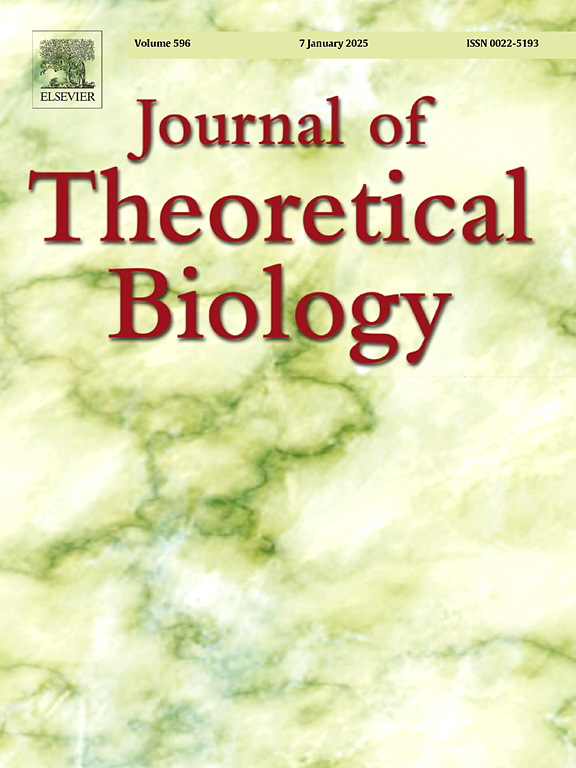Exploring the treatment of SARS-CoV-2 with modified vesicular stomatitis virus
IF 1.9
4区 数学
Q2 BIOLOGY
引用次数: 0
Abstract
SARS-CoV-2 caused a global pandemic and is now an endemic virus that will require continued antiviral and vaccine development. A possible new treatment modality was recently suggested that would use vesicular stomatitis virus (VSV) modified to express the ACE2 receptor. Since the modified VSV expresses the cell surface receptor that is used by the SARS-CoV-2 spike protein, the thought is that SARS-CoV-2 virions would bind to the modified VSV and thus be neutralized. Additionally, since SARS-CoV-2 infected cells also express the spike protein, the modified VSV could potentially infect these cells, allowing for its own replication, but also potentially interfering with replication of SARS-CoV-2. This idea has not yet been tested experimentally, but we can investigate the feasibility of this possible treatment theoretically. In this manuscript, we develop a mathematical model of this suggested treatment and explore conditions under which it might be effective. We find that treatment with modified VSV does little to change the SARS-CoV-2 time course except when the treatment is applied at the onset of the SARS-CoV-2 infection at very high doses. In this case, VSV reduces the peak SARS-CoV-2 viral load, but lengthens the duration of the SARS-CoV-2 infection. Thus, we find that modified VSV treatment is unlikely to be effective largely because it does not prevent infection of cells by SARS-CoV-2.
探索用改良水泡性口炎病毒治疗 SARS-CoV-2
SARS-CoV-2 造成了全球大流行,现在已成为一种地方性病毒,需要继续开发抗病毒药物和疫苗。最近有人提出了一种可能的新治疗方法,即使用经修饰的水泡性口炎病毒(VSV)来表达 ACE2 受体。由于改造后的 VSV 表达的细胞表面受体是 SARS-CoV-2 棘突蛋白所使用的,因此人们认为 SARS-CoV-2 病毒会与改造后的 VSV 结合,从而被中和。此外,由于受 SARS-CoV-2 感染的细胞也表达尖峰蛋白,经过修饰的 VSV 有可能感染这些细胞,从而实现自身复制,但也有可能干扰 SARS-CoV-2 的复制。这一想法尚未得到实验验证,但我们可以从理论上研究这种可能的治疗方法的可行性。在本手稿中,我们建立了这一建议疗法的数学模型,并探讨了其可能有效的条件。我们发现,使用改良 VSV 治疗对 SARS-CoV-2 的时间进程几乎没有影响,除非在 SARS-CoV-2 感染开始时使用非常高的剂量进行治疗。在这种情况下,VSV 会降低 SARS-CoV-2 病毒载量的峰值,但会延长 SARS-CoV-2 感染的持续时间。因此,我们发现改良的 VSV 治疗不可能有效,主要是因为它不能阻止细胞感染 SARS-CoV-2。
本文章由计算机程序翻译,如有差异,请以英文原文为准。
求助全文
约1分钟内获得全文
求助全文
来源期刊
CiteScore
4.20
自引率
5.00%
发文量
218
审稿时长
51 days
期刊介绍:
The Journal of Theoretical Biology is the leading forum for theoretical perspectives that give insight into biological processes. It covers a very wide range of topics and is of interest to biologists in many areas of research, including:
• Brain and Neuroscience
• Cancer Growth and Treatment
• Cell Biology
• Developmental Biology
• Ecology
• Evolution
• Immunology,
• Infectious and non-infectious Diseases,
• Mathematical, Computational, Biophysical and Statistical Modeling
• Microbiology, Molecular Biology, and Biochemistry
• Networks and Complex Systems
• Physiology
• Pharmacodynamics
• Animal Behavior and Game Theory
Acceptable papers are those that bear significant importance on the biology per se being presented, and not on the mathematical analysis. Papers that include some data or experimental material bearing on theory will be considered, including those that contain comparative study, statistical data analysis, mathematical proof, computer simulations, experiments, field observations, or even philosophical arguments, which are all methods to support or reject theoretical ideas. However, there should be a concerted effort to make papers intelligible to biologists in the chosen field.

 求助内容:
求助内容: 应助结果提醒方式:
应助结果提醒方式:


